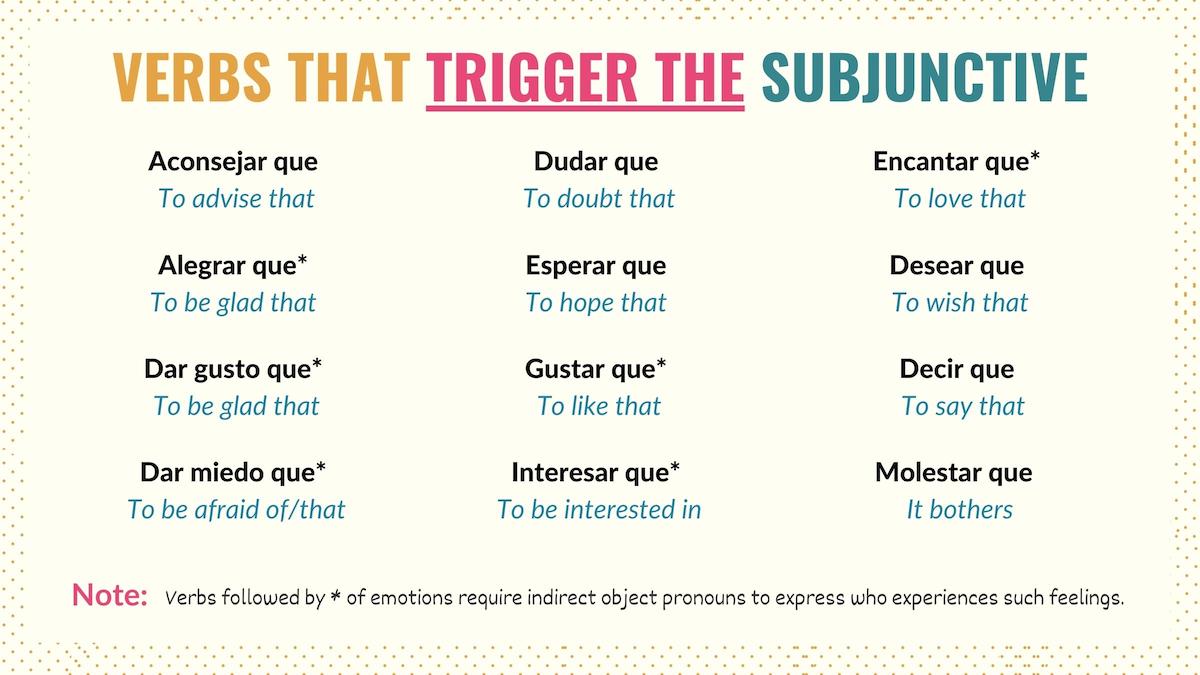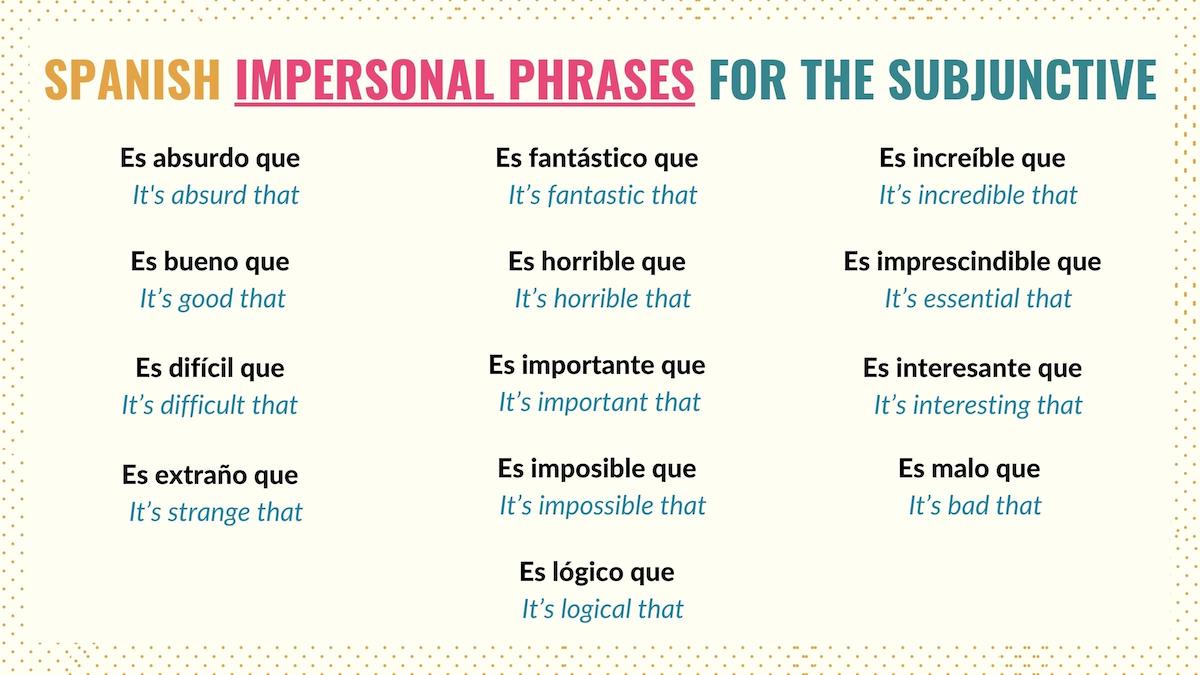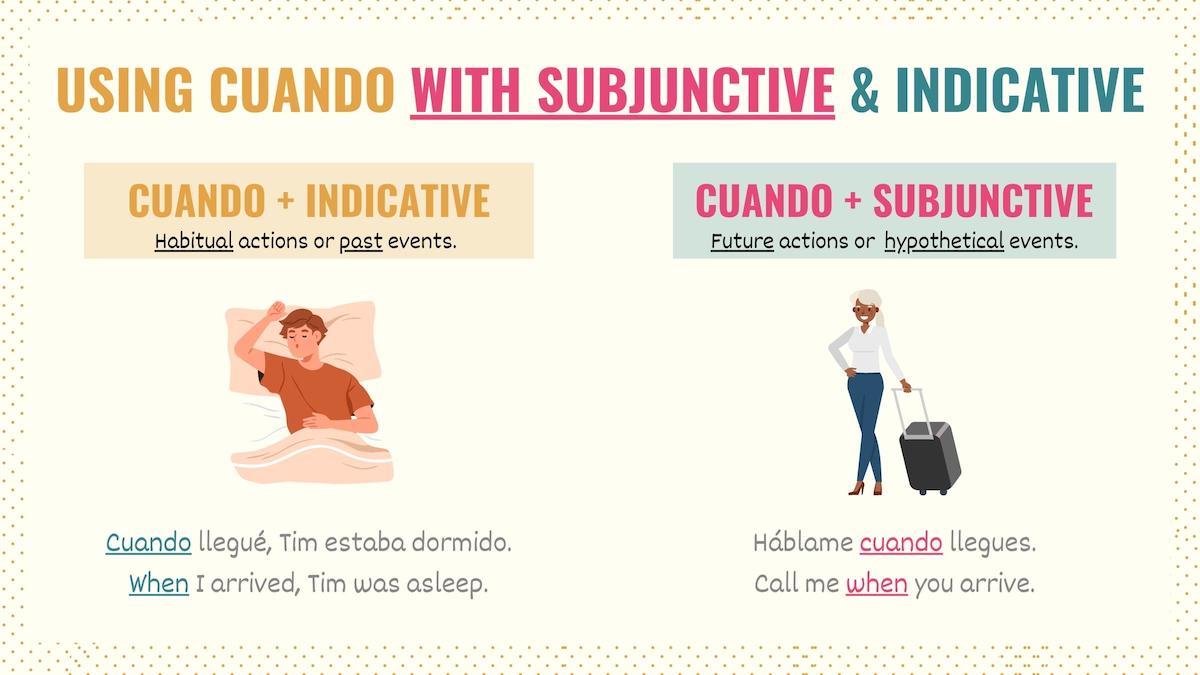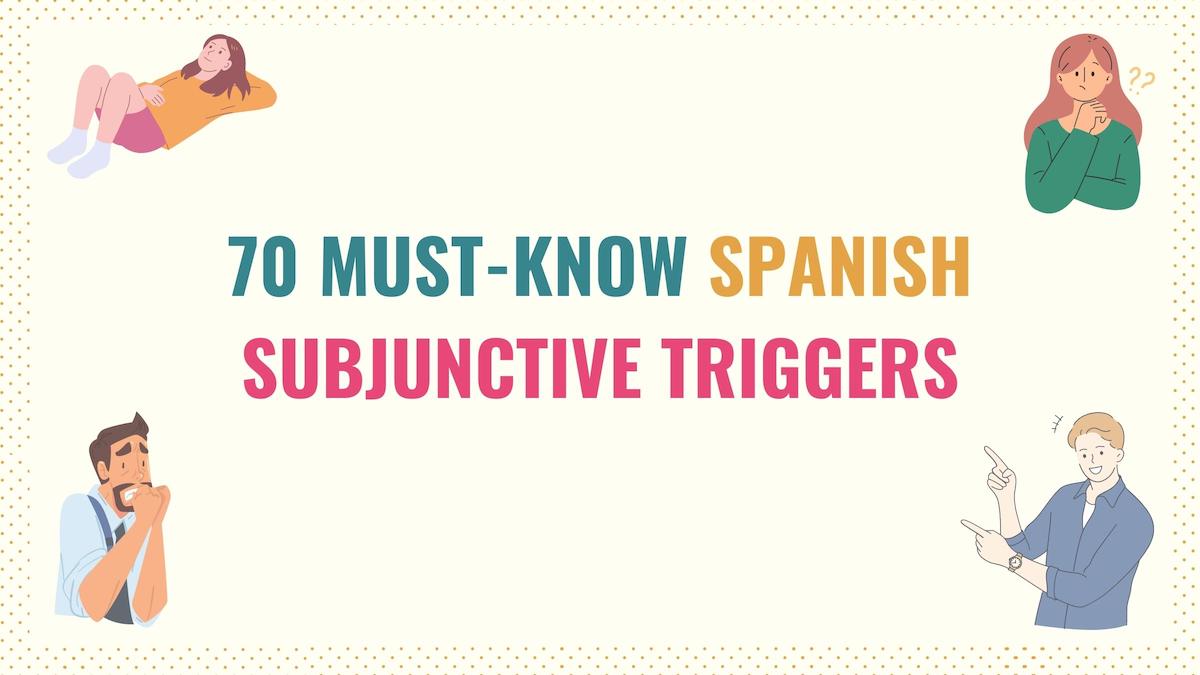In Spanish, there are some words and phrases that work with the subjunctive. These Spanish subjunctive triggers are essential and useful for identifying when you need to use the subjunctive mood. So, in this guide, I’ve compiled a list of common verbs and phrases you should know.
Here is a summary of what you’ll find in this guide:
- Verbs that Trigger the Subjunctive in Spanish
- Words and Subjunctive Phrases
- Key Points
- Related Resources
I’ve also made sure to include simple examples using this vocabulary so you can check how to apply each one of these subjunctive triggers.
Let’s do this!
Verbs that Trigger Subjunctive in Spanish

Because of its applications, the verbs that trigger the subjunctive are Spanish verbs that express hopes, desires, emotions, requests, recommendations, and uncertainty.
The most common verb triggers for the subjunctive are:
- Aconsejar que: To advise that
- Alegrar que*: To be glad that
- Dar gusto que*: To be glad that
- Dar miedo que*: To be afraid of/that
- Decir que: To say that
- Desear que: To wish that
- Dudar que: To doubt that
- Encantar que*: To love that
- Esperar que: To hope that
- Gustar que*: To like that
- Interesar que*: To be interested in
- Molestar que: It bothers
- Necesitar que: To need that
- No creer que: To not think that
- Pedir que: To ask that
- Permitir que: To allow that
- Preocupar que*: To worry that / To be worried
- Prohibir que: To forbid that
- Querer que: To want that
- Recomendar que: To recommend that
- Sentir que: To feel that
- Sorprender que*: It surprises
- Sugerir que: To suggest that
The terms followed by an asterisk (*) are verbs of emotions and require Spanish indirect object pronouns to mention who is the person experiencing that feeling.
Notice that verbs that trigger the subjunctive are followed by the word que, term that introduces the clause in subjunctive form. Here are some examples:
[Verb trigger] + que + [verb in subjunctive]
Les sugiero que hablen con la directora.
I suggest you speak with the director.
Me preocupa que Chris se vaya a lastimar.
I am worried that Chris is going to hurt himself.
Dice Paola que dejes de preguntar por ella.
Paola says you stop asking for her.
Mauricio nos pidió que no dijéramos nada.
Mauricio asked us not to say anything.
Te molesta que yo tome tu celular sin permiso.
It bothers you that I take your phone without permission.
Take Note: Verbs that trigger the subjunctive in Spanish are used in sentences with two subjects and verbs.
Spanish Subjunctive Phrases & Words

In addition to the list of verbs above, certain Spanish impersonal expressions are also subjunctive triggers. Most of these phrases are formed with es + adjective.
Here are some of the most common phrases that trigger the subjunctive in Spanish:
- Es absurdo que: It’s absurd that
- Es bueno que: It’s good that
- Es difícil que: It’s difficult that
- Es extraño que: It’s strange that
- Es fantástico que: It’s fantastic that
- Es horrible que: It’s horrible that
- Es importante que: It’s important that
- Es imposible que: It’s impossible that
- Es imprescindible que: It’s essential that
- Es increíble que: It’s incredible that
- Es interesante que: It’s interesting that
- Es lógico que: It’s logical that
- Es malo que: It’s bad that
- Es mejor que: It’s better that
- Es natural que: It’s natural that
- Es necesario que: It’s necessary that
- Es normal que: It’s normal that
- Es preferible que: It’s better that
- Es probable que: It’s probable that
- Es ridículo que: It’s ridiculous that
- Es suficiente que: It’s enough that
- Es terrible que: It’s terrible that
- Es una lástima que: It’s a shame that
- Es urgente que: It’s urgent that
- Puede que: It’s possible that / It might
These expressions can be used in negative form and you can also conjugate them in different tenses. Here are some examples using these expressions:
Es probable que mis amigas no vengan.
It’s likely that my friends aren’t coming.
Tranquila, es normal que te sientas triste.
Easy. It’s normal that you feel sad.
No es necesario que traiga su identificación.
It’s not necessary for you to bring your ID.
Niños, es importante que me digan que pasó.
Kids, it’s important that you tell me what happened.
Take Note: There are some impersonal expressions that are used with the Spanish indicative mood. But notice that those phrases express certainty and truth (es obvio, es cierto, es verdad).
Words that trigger the subjunctive
Spanish adverbs and conjunctions that convey probability, uncertainty, hope, or refer to hypothetical scenarios are also triggers for the Spanish subjunctive mood.
- A fin de que: So that
- A no ser que: Unless
- A pesar de que: Although
- Aunque: Even though
- Como si: As if
- Con la condición de que: On the condition that
- Con tal de que: As long as
- Cuando: When
- De ahí que: Hence / Therefore
- Después de que: After
- En caso de que: In case
- En cuanto: As soon as
- Hasta que: Until
- Para que: So that
- Posiblemente: Possibly / Perhaps
- Probablemente: Probably / Likely
- Sin que: Without
- Quizá: Perhaps / Maybe
- Tan pronto como: As soon as
- Tanto como: As much as
- Tal vez: Maybe
- Ojalá: I hope / Hopefully
Here are some sentences using some of these subjunctive triggers:
[Conjugated verb] + [trigger] + [verb in subjunctive]
Háblame cuando llegues.
Call me when you get there.
Nos vamos en cuanto deje de llover.
We’re leaving as soon as it stops raining.
Te voy a esperar hasta que termines.
I’m going to wait for you until you finish.
Tal vez mañana no vaya a trabajar.
Maybe I won’t go to work.
¿Podemos hablar cuando tengas tiempo?
Can we talk when you have time?
Take Note: The word cuando can also be used with indicative tenses. However, those sentences refer to habitual actions or events that have already happened. Cuando + subjunctive is a time marker for future and hypothetical events that have not occurred yet, and we’re not completely sure they will happen.

Key Points
Many verbs and phrases set off the subjunctive mood in Spanish. Here are some important points you need to know:
- Verbs, words, and phrases that convey doubt, desires, hopes, demands, suggestions, uncertainty, and probability are subjunctive triggers.
- Examples of common verbs that trigger the Spanish subjunctive are esperar, querer, pedir, and aconsejar.
- Spanish verbs of emotion express the feelings someone’s actions or behavior causes in a person.
- Verb triggers for the subjunctive are used in sentences with two subjects and two verbs.
- Many expressions with es + adjective are examples of impersonal phrases with subjunctive.
- Impersonal phrases that imply certainty or factual information are used with the indicative mood.
Spanish Subjunctive Related Resources
Even though knowing common Spanish subjunctive triggers can signal that a sentence requires the subjunctive, you should still learn how and when to use this mood. Also, make sure you review indirect object pronouns since many verbs of emotion use these pronouns.
As a tip, you should remember that the word ojalá is one of the most well-known subjunctive triggers.
Download the Subjunctive Triggers Spanish PDF
As you’ve seen, there are many verbs, phrases, expressions, and words that trigger the subjunctive mood in Spanish. Download the PDF for this guide with all the complete lists of triggers as well as the graphics and key points.



